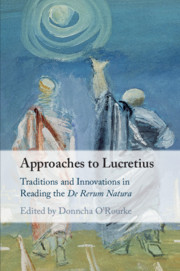Book contents
- Approaches to Lucretius
- Approaches to Lucretius
- Copyright page
- Contents
- Figures
- Notes on Contributors
- Preface
- Abbreviations
- Introduction
- Part I The Text
- Part II Lucretius and his Readers
- Chapter 2 Reading the ‘Implied Author’ in Lucretius’ De Rerum Natura
- Chapter 3 Common Ground in Lucretius’ De Rerum Natura
- Chapter 4 Coming to Know Epicurus’ Truth: Distributed Cognition in Lucretius’ De Rerum Natura
- Part III The Word and the World
- Part IV Literary and Philosophical Sources
- Part V Worldviews
- Works Cited
- Index Locorum
- Index Rerum
Chapter 3 - Common Ground in Lucretius’ De Rerum Natura
from Part II - Lucretius and his Readers
Published online by Cambridge University Press: 25 June 2020
- Approaches to Lucretius
- Approaches to Lucretius
- Copyright page
- Contents
- Figures
- Notes on Contributors
- Preface
- Abbreviations
- Introduction
- Part I The Text
- Part II Lucretius and his Readers
- Chapter 2 Reading the ‘Implied Author’ in Lucretius’ De Rerum Natura
- Chapter 3 Common Ground in Lucretius’ De Rerum Natura
- Chapter 4 Coming to Know Epicurus’ Truth: Distributed Cognition in Lucretius’ De Rerum Natura
- Part III The Word and the World
- Part IV Literary and Philosophical Sources
- Part V Worldviews
- Works Cited
- Index Locorum
- Index Rerum
Summary
This paper addresses the role of first-person plural expressions in DRN. I begin by outlining some ambiguities in the Latin first person plural before going on to demonstrate how those ambiguities may function for readers of DRN. First I show how ambiguity between inclusive and exclusive uses of the first person plural allow such expressions as quod inane vocamus to be interpreted differently by readers at different stages of their Epicurean education. I then discuss Lucretius’ use of inclusive first-person plural forms to characterize his own relationships with his reader. Finally, I discuss the role of collective first-person plurals in the argumentation of the poem, and its implications for Lucretius’ avowed empiricism. A central aim of the paper is to show how the ambiguities inherent in the language of Lucretian didaxis allow for different responses by different groups of readers.
- Type
- Chapter
- Information
- Approaches to LucretiusTraditions and Innovations in Reading the <I>De Rerum Natura</I>, pp. 59 - 79Publisher: Cambridge University PressPrint publication year: 2020
- 1
- Cited by



